Termites can be quite horrific pests. While the workers and soldiers only live a year or two, the queens have a nasty habit of sticking around and when they get in your mulch… Well, you know how bad it can be! Today we’re going to talk about the best mulch to use to avoid termites altogether so that you can make this pest problem a thing of the past.
We’ll cover the types of mulch that attract them, as well as the ones that termites seem to hate, and we’ll also give you some commercial mulch examples and some tips for both dealing with them and buying your mulch so that you can make an effective anti-termite strategy on your own.
If you’re in a hurry here are the top 3 options to go for:
- Best: Cedar mulch – Cedar contains a chemical called thujone which is toxic to termites. It is long-lasting and effective, but can be more expensive than other options.
- Best value: Melaleuca mulch – Also known as Florimulch, this hardwood is not only affordable but also unpalatable to termites.
- Cheapest: Inorganic mulch – Options such as rubberized mulch, stones, or gravels are decorative, termite-resistant, and low-maintenance. However, they do not contribute nutrients to the soil like organic mulches do.
Let’s discuss the best mulch to use to avoid termites and other important tips that you need to know!
Table of Contents
Does some mulch attract termites?

Everyone knows that termites eat wood, but you need to also keep in mind that not all woods are the same. Woods that are attractive to termites include Loblolly pine, slash pine, and cypress mulches that contain a lot of sapwood, rather than heartwood.
Shredded varieties are less attractive to termites, although they will still lure a few hungry ones in, but the most attractive mulches will consist of bark and wood chips.
The good news is that there are plenty of hardwoods that termites either cannot penetrate to eat or which actually include natural oils that the bugs will find repulsive. Let’s explore a few of these so that you’ll know the basic types of mulch to look for.
What mulches do Termites dislike?

When it comes to termites, certain mulches and mulch additives are definitely better than others. Nature has been aware of the termite problem for a long time, after all, and this is something that you can and should take advantage of.
Let’s take a peek at some mulches that termites dislike so that you’ll have a good foundation to build on when it comes to whipping-up a termite-repellent mulch.
As chemically-treated mulches are quite common, we’ll focus on natural and, briefly, on inorganic mulch options that you might not have been aware of.
Cedar mulch

Cedar is one of the best natural options that you have for keeping those pesky termites at bay. That’s because it contains a chemical called thujone, which is toxic to termites! It’s also the longest-lasting option, as the hardwood is quite hardy and will decay into a very solid soil barrier over time.
The downside, unfortunately, is that you get what you pay for – cedar mulch is going to cost more, but for what you get this is arguably worth it!
Cocoa Bean Mulch
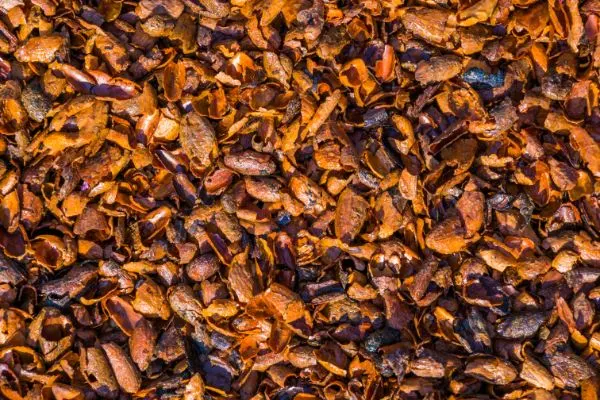
Chocolate is one of those odd foods that we can enjoy, but which is highly toxic to other animals, and as it comes from cocoa beans, you can guess where we’re going with this. Cocoa bean mulch is a pricey, but good option that will keep away both slugs and termites.
The cocoa bean shells emit a scent that gives away its toxicity to these pests, so that they will steer well clear of it and leave your plants alone. If you have pets or local strays, however, this is not a recommended option. The caffeine content, as well as a chemical called theobromine, make this mulch a potentially lethal risk for dogs or cats that ingest it.
Coconut Coir
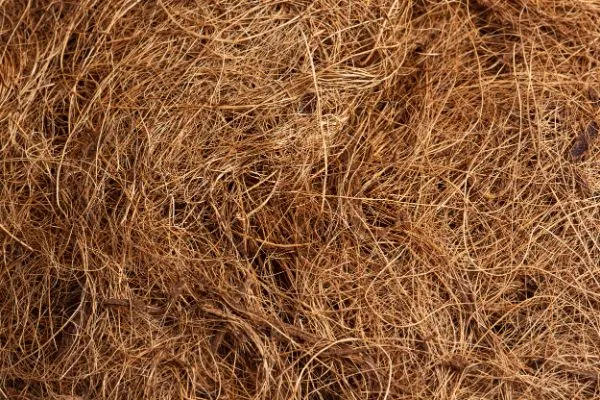
Coconut coir is a fiber that comes from coconuts and it’s another effective mulch for keeping termites away. Both coconut husks and coir are thick enough that it’s basically hard for termites to eat, so they’re going to leave it alone and should stay away from any tree or other plants that you are mulching with it.
This hush fiber also helps to keep plants well hydrated, as it absorbs water quite well, so this is definitely another termite resistant mulch which you might consider.
Cypress Mulch

Cypress mulch is a mulching option that comes with a lot of perks, but you need to select it carefully. The reason for this is that some cypress mulches contain sapwood, which can actually attract hungry termites who are looking for a sweet treat.
Sans the sapwood, however, cypress mulch is pretty handy to have. It breaks down slowly and it also has antifungal properties that Nature has imbued the wood with.
If you are considering cypress mulch, just be sure to research the company and check the reviews on the product to make absolutely sure that you aren’t getting sapwood-infused cypress. If you are willing to do this, then it really does make a fantastic mulch.
Inorganic Mulch
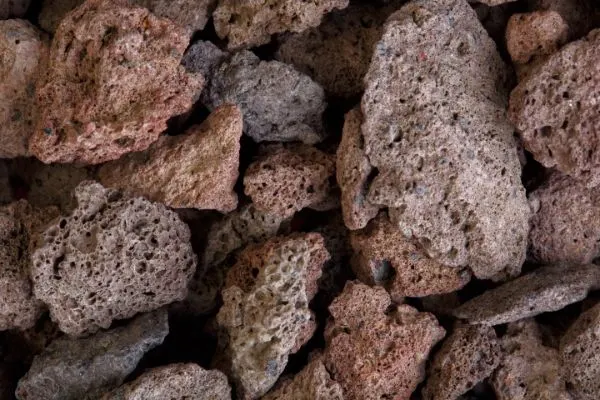
Inorganic mulches are another option, such as rubberized mulch, stones, or gravels. It’s highly decorative and a great way to stave-off termite infestations, but it can also be a little pricey and aside from options such as volcanic rock, it’s not going to contribute nutrients to the soil.
That said, an option such as ‘rubber mulch’ can help to keep moisture in and provide a mulching substrate that termites will have absolutely zero interest in, and it looks good, lasts a long time, and maintaining it is just a matter of spraying it off and making sure it doesn’t get compacted.
Licorice Root Mulch

Licorice root mulch is another option that you can use and if you can’t find it, you can also add licorice oils to your mulch to good effect. While the smell reminds most of us of eating candy as a child, termites and many other pests simply can’t stand it!
If you can find the roots themselves, however, then you also get the added bonus of antifungal properties, so the next time you are at a nursery, be sure to keep an eye out for licorice root mulch – it’s less common than many other types, but an excellent option once you’ve cornered a supplier.
Melaleuca mulch
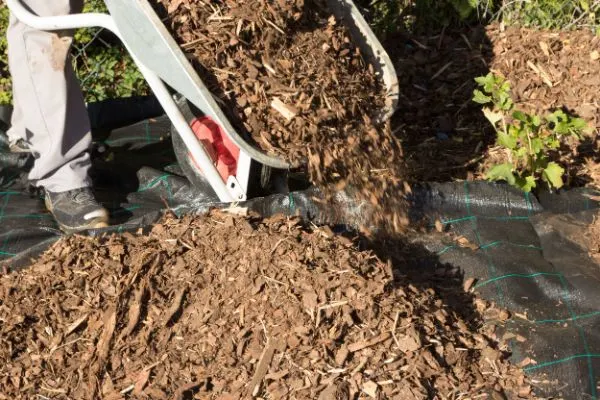
The melaleuca tree originally hails from Australia, but it also grows these days in Florida and it makes for an excellent mulch. The Florida variety is typically marketed as ‘Florimulch’ and this hardwood is not only cheap, but also not so palatable to termites, who tend to leave it alone and look somewhere else for an easy, more-digestible meal!
Redwood mulch
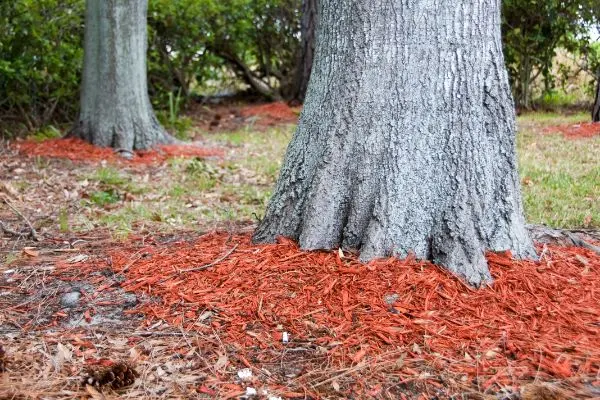
Most wood mulch options are going to be hardwoods, as termites have such a hard time sinking their little teeth into, but Redwood is one notable exception to the rule. That’s because the California redwood is a softwood that Nature has evolved to include a resin which is toxic to termites.
This makes for an excellent mulch, but there is a caveat – as it is a softwood, it’s going to break down quickly, so if you go with redwood then you should know that you will need to replace it quite regularly to continue enjoying the perks.
Best mulch to use to avoid termites
Now that we’ve reviewed some of your best mulching options, we’re going to take a moment to show you some examples which you can purchase online or look for locally to use as a mulch for your trees or garden. We’ll tell you a little about each product, touching briefly on user reviews, and later on in this article we’ll also share our favorites with you in case you’re still ‘on the fence’ about the best option for you.
Without further ado, let’s take a look at the best commercial mulch to use to avoid termites!
1. Wood Smith 100% Natural Cedar Shavings and Chips

Cedar chips and shavings have a nice advantage, in that they are often used as bedding for pets. This means that it’s one of the easiest mulches to find and this offering from Wood Smith is a fine example.
This product is 100% natural and aromatic cedar, which will help to keep moisture in when you use it as a mulch, while also working hard to keep the termites out. It’s inexpensive, effective, and this particular listing comes in a 5-quart size – not a bad deal at all!
Scouring the reviews, 72% gave it 5 stars, while another 13% gave it 4, although we did find a handful of complaints in the 1 star department that felt the cedar shavings were too fine. As the overall reaction was positive, we still feel that this is a good product but feel free to check the reviews yourself and shop around if you don’t feel confident with this particular brand.
2. Cedarcide Granules

For the concentrated power of cedar, these cedarcide granules really make for a superior mulching option. Made of 100% cedar and rick in cedarwood oils, this mulching additive will help to keep mosquitoes, termites, fleas, and mites away effectively. As they are tiny granules, you can also use it to supplement your own favorite mulch recipes to great effect.
One caveat – you will need to keep them watered, otherwise they’ll be vulnerable to the wind, but if this is okay with you then these granules make an excellent natural repellant for those pesky termites. As far as the reviews, 70% gave it 5 stars and another 12% gave it 4, with many users also reporting that it kept away flies and waterbugs nicely, as well as other pests.
In the 1 star reviews, however, there were a lot of buyers who complained that it doesn’t work so well with mosquitoes, so we wanted to share this just in case termites aren’t your only motivation.
3. MIGHTY109 Premium Shredded Redwood Mulch

If you’re looking for a nice redwood mulch, this Mighty109 shredded redwood mulch is just what the doctor ordered. You’ll get 100% redwood mulch (also marketed as ‘gorilla hair mulch’, and aside from keeping the termites at bay, it can help you avoid soil erosion and help to keep the moisture in so that your plants are nice and hydrated.
Checking the reviews, the Mighty109 was unfortunately a little scarce – just 4 reviews at current, so it’s all 4 and 5 stars. Still, as it is 100% redwood, it’s kind of hard to go wrong, but feel free to check around for other redwood mulches if the small amount of reviews is a dealbreaker.
4. Hull Farm 50150 Cocoa Bean Shell Mulch

Hull Farm offers an excellent cocoa bean shell mulch if that’s what you’re in the market for. Provided that you don’t have pets or local strays visiting your garden, cocoa bean shell mulches like this one are an excellent option for retaining moisture, keeping pests at bay, and for preventing soil erosion.
The hard bean husks decay very slowly, so they tend to leave a solid soil barrier in their wake once they finally decompose.
In the reviews, 75% gave this product 5 stars, while another 15% gave it 4, with many users citing the wonderful chocolate smell and superior moisture retention of the product.
As far as complaints in the 1 star category, one customer advised that their avocado tree became unhealthy and there were some complaints of mold – so it would be worthwhile to research cocoa bean shell mulch for your specific region.
This will help to make sure that it should be efficient in your specific environs and help you to avoid any regional pitfalls with this mulch.
5. Envelor Coco Coir 10 pound mulch brick

Coco Coir and chips are a fantastic mulching option and this Envelow Coco coir mulch can help you to try it out for yourself. It comes in a 10 pound bag and while it looks compacted, it will expand nicely once you add water, so start off small.
This chips and fiber combo is definitely useful – it provides proper aeration while also retaining moisture and as coconuts are naturally resistant to termites, you won’t have any trouble with them if you go with this popular mulch.
Sidling off into reviewland, a whopping 80% of the 738 reviewers gave this product 5 stars, while 11% grumbled a little and only gave it 4. Moving on to the worst ratings, we have 2% that advised they found impurities in their own bags, and one reviewer had a problem with mold. With the overwhelmingly positive reviews, however, take this as you will.
6. Rubberific Shredded-Rubber mulch (Redwood style)

We wanted to include an inorganic option in the mix and so here it is. This Rubberific shredded rubber mulch has the look of redwood, but you’ll never have to worry about it decaying.
Rubber mulch has a few nice perks, aside from being inedible to termites. It looks great for years, for one thing, but it also does a nice job of keeping moisture in while keeping pests out.
It’s also very easy to maintain, as you simply need to rake it from time to time to make sure that it doesn’t compact and you can hose it off to make it look clean and nice with very little effort on your part.
So, how did the reviewers like it? Well, 69% gave it 5 stars, while another 11% gave it 2. The positive reviews were quite happy with the color and overall performance. Going to the flipside, in the bad reviews color is also mentioned, but in a negative way.
Some complained that the red shades were varied enough that large purchases were not recommended unless you are buying it in person. Beyond this, some complained that it was light and not good for areas with high winds.
7. Nutroeno Compressed Coconut Husk Chips

Our final entry is another coconut coir variety mulch from Nutroeno and it’s definitely the good stuff. Made of tiny pieces of coconut husk, it will not be found delicious by your local termites, and will also decay at a nice, slow rate.
This will help you to retain proper moisture and the lightweight coconut chips will also give you superior aeration while they are protecting your plants.
In the reviews, Nutreono did pretty well, with 73% of customers giving it 5 stars, while another 15% settled on 4. There were some 1 star reviews, of course, but only one really caught our attention – one customer said that the coconut husks were dyed and caused a problem for her orchids.
While we were unable to independently confirm if this is the case, we wanted to make sure that you were aware that this complaint WAS listed so that you may consider alternatives if this might be a problem.
Best newbie tips for anti-termite strategies
If you are worried about termites or currently experiencing an infestation, then it pays to have a battle plan. Below are some tips to help you when dealing with these pests:
- While chemical treatments are unpopular, in some cases this will still be the best option. Some insecticides can stop an infestation in its tracks within 24 hours, so research these options if the infestation is already advanced.
- Sometimes the best approach for infested mulch is to remove it and replace it completely with a cedar or redwood alternative to prevent re-infestation.
- Cardboard traps are available that can help to lure out termites and which you may then dispose of by burning. This only works for minor infestations, but if you catch them in time then this might be exactly what you need.
- Orange oil makes for a great natural pesticide. An ingredient in it called d-limonene can actually compromise their chitin shells, killing the termites on contact. It also smells pretty amazing for a termite poison, which is a nice bonus!
Buying information for Anti-termite mulch
When you are looking for a new mulch to use, there are definitely some pitfalls that you’ll want to avoid, and so we thought that we would give some helpful tips for the process. Here are a few recommendations to use when purchasing your mulch:
- Consider buying it at a local store – this will let you see the consistency, to make sure that you don’t end up with ‘sawdust’ and you can also check the color and the aroma.
- If you buy online, always check the worst reviews first – period. You don’t want to receive your mulch and have to do it later when you are adding a bad review of your own!
- Inorganic mulches are the lowest-maintenance option and really look good. They are a little pricier, but when you consider that they will last for many years and definitely won’t attract pests, then they are well-worth the investment.
- Hardwood mulches cost more, but they also decay more slowly and you’ll get a robust soil buildup for your troubles. This is very much worth it in the long run, so consider it in terms of ‘what am I looking for a few years down the line’. An extra dollar or two now can go a very long way with mulch.
- Aromatic hardwood additives will give you all of the perks, while letting you mix your own mulch to maximize nutrients. It’s a little more work but the results can be amazing.
Product recommendations
We’d have to say that our favorite mulch option was the Cedarcide Cedar granules. With mulch, you can certainly go with a ‘one size fits all’ approach, but it’s simply not going to be as good as mixing up something nutritious for your plants. With that in mind, these granules are perfect – you get the natural oils and protection that Cedar offers and you can mix it with the mulch of your choice.
At second place, we also liked the Rubberific shredded ‘redwood’ mulch, as this is the lowest-maintenance mulching option you’re going to find. Yes, it’s not nutritious like a homemade mulch, but it will help to trap moisture and protect your plants from pests who won’t be attracted to the rubber at all.
FAQs
Before we wrap things up, we’ve collected a few frequently asked questions for you on the way out in an attempt to ‘patch up’ any spots that we might have missed along the way. Let’s take a look!
Does mulch next to the house cause termites?

No, not necessarily. While certain types of mulch will attract termites, the biggest danger is oversized mulch piles. For instance, if you placed a mulch pile with a depth of 3 inches near your home, then it’s definitely an invitation for all kinds of pests, rather than termites alone.
What happens is that the thick mulch creates a small, moisture-rich environment that termites and other pests can use as shelter – as such it’s not really a good idea to put organic mulch close to your home, but it’s not just a matter of termites.
Is it better to put stone or mulch around the house?

Stone or rubberized mulch is really the best option next to your home. It’s not going to attract pests and it’s not only easy to maintain, but it looks great. With an organic mulch pile, you’ll be replacing it on a regular basis, and there is a higher likelihood of attracting pests, so stick to inorganics if the mulch will be close to your home.
How long do termites live in mulch for?
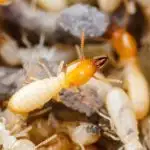
While the workers and the soldiers can live for as long as a year or two, the queens are the real problem — they’ve been known to live for more than a decade if the conditions are right. That’s why it’s best to go with professional assistance when you’ve got a termite infestation if traps and replacing the mulch don’t seem to be getting any mileage. They’re simply too destructive and you ignore them at your own peril!
Some final words on mulch and termites
In today’s article we’ve explored various mulches that attract and repel termites in order to help you strategize a solution to these annoying pets. Left unchecked, termites can infest your mulch mounds and even get at your home if they’re too close and it’s susceptible.
Remember that certain woods like cedar and heartwood cypress can keep them at bay and also consider inorganics or pellet granules, so that the termites won’t be attracted or simply unable to enjoy the mulch pile.
With a little planning you should be able to get all of the perks of the mulch pile, without inviting an infestation of these undesirable pests. We hope that you’ve enjoyed this article and that we’ll see you again soon!
More gardening tips
